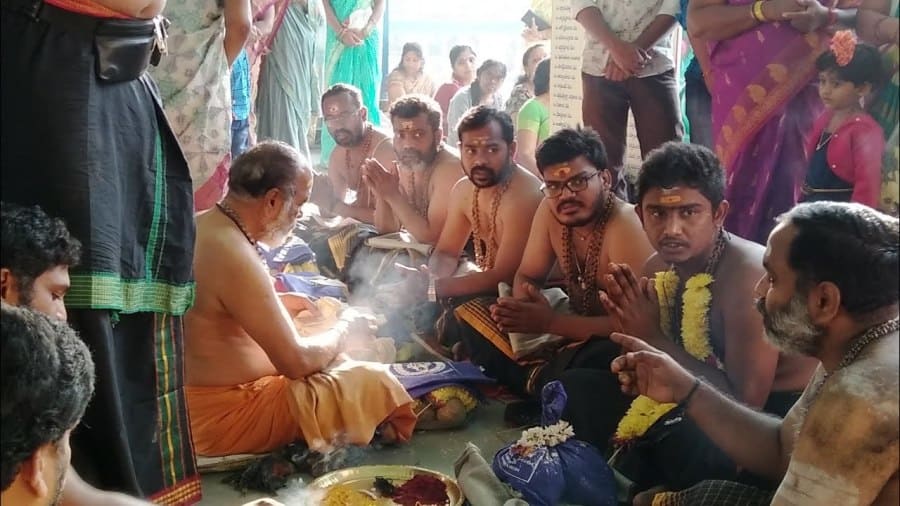Ayyappa Deeksha Rules and Regulations (Ayyappa Mala Deeksha Niyamalu)
Ayyappa Swamy Deeksha is a religious observance performed by devotees of lord Ayyappa during their journey to sabarimala especially. This Ayyappa Deeksha is for 41 days but some may choose to keep it longer. It is necessary to observe certain do’s and don’ts known as Ayyappa Deeksha Rules or niyamas to keep the sanctity of this period.
In an ideal situation, a ‘Vrutham’ begins on the very first day the pilgrim puts on the chain (a Mala in Malayalam) which signifies his determination to observe such austerity. This particular ritual is referred to as ‘Malayideel’ or ‘Malayiraagu’ in the parlance of the locals.
Here below is the list of the important Ayyappa Deeksha Rules and Regulations that must be observed by the devotees.
15 Essential Niyamas for Ayyappa Swamy Mala Deeksha (Ayyappa Deeksha Rules)
Find below the 15 essential Ayyappa Deeksha Rules (Niyamas) that one has to follow for Ayyappa Swamy Deeksha:

1. Duration of Ayyappa Deeksha | Ayyappa Swamy Deeksha how many days?
In almost all cases Lord Ayyappa’s devotees perform their deeksha for a period of 41 days, a number that carries importance just like that of the Ayurvedic therapies which also happen to be in the same range. This time interval is meant towards enabling total change of shape of both body and mind and therefore. During this period of deeksha devotees are supposed to follow all the set practices and in doing so they hope to attain self-control and deepen their spirituality in readiness for a significant change in state of the being.
The 41 day period (ayyappa deeksha days) is not only about discipline towards practices but it also shapes into being a time that focuses on habitual change. In the course of time as devotees perform these devotional practices like the practice of mind purification and vices relinquishment, such practices become second nature to man. This nature changing event helps in broadening the understanding of a person towards himself and also towards the God. This Ayyappa Swamy Deeksha becomes a therapeutic process of reconstruction in which correct principles and values are formed and self and purpose are developed.
– Ayyappa Deeksha 11 days Duration
Ayyappa Swamy Deeksha, normally lasts for 41 days but those unable to observe longer terms can also observe 11 or 21 days. The participants who are mainly males and females who do not menstruate, have to observe total of abstinence and adherence to strict rules including celibacy, specific dietary restrictions, and daily prayers on all days. The observance finishes with a visit to the Sabarimala shrine in Sabarimala in the state of Kerala, India. Though the norm is 40 days, the minimum number of days which has to be completed for the purpose of performing the yatra is usually 11 days.
2. Purity of Mind
– Mental Clarity:
A pure mind is very much needed at all times, especially during the Ayyappa Swamy deeksha. A Mind with with clarity and the ability to focus on a specific thought helps the devotees in the mastery of their emotions and feelings, which is necessary. The devotees through self-control and slow realization are able to attain a certain kind of focus which allows them to be in touch with the god. A clear focus of thought allows the adherents of the spiritual practice to create such circumstances where the day to day activities do not stray them away from spirituality.
– Ego Reduction:
When every devotee learns to see everybody as God, the feeling of ‘I’ begins to slowly fade away and it helps ego reduction. If everyone were to deeply appreciate the divine essence within one another, such conflict would not even be conceivable. By looking at events such as this, the ‘I’ is removed from consideration which helps reduce eager tendencies. Such gradual loss of ‘I’ allows for love and kindness to come in, along with the ability to truly connect with oneself and others. Such changes occur during deeksha which is necessary for this formation in spiritual understanding. These teachings are most essential and true to Lord Ayyappa’s messages and teachings.
3. Early Rising (Brahma Muhurta)
– Waking at 4 AM
Brahma Muhurta is the period between 4:00 AM and 5:30 AM which is one of the richest spiritual throbs for practitioners of deeksha. For example, devotees are able to engage in most, if not all, spiritual practices or rituals at this hour of the day. The reason this hour is so ideal for meditation is simply because the mind is rested and tunefully directed towards devotion. Alongside that, during this period, engaging in proper meditation, devotees are able to immerse themselves in their inner-selves and the supreme being instantly. Furthermore, the stillness of the early morning helps to reduce distractions which enables an individual to raise their energy and connect to more elevated frequencies much faster and simpler.
– Nature’s Peace
Brahma Muhurta also stands out for its calming character. For example, by the nature of Brahma, the whole world at this hour is still, making Brahma the perfect state of balance. This stability allows for a more profound connection with nature, ensuring that energies can flow freely and that spiritual pursuits can be deepened. Not only does praying or meditating during this hour provide an opportunity for individuals to invocate the divine, but these spiritual activities during this time also instill an appreciation of god’s creation within devotees, allowing them to appreciate the beauty of the world whilst worshiping.
4. Daily Pooja Rituals
– Twice Daily Pooja
The practice of performing pooja twice daily, before the break of dawn and after the sun sets is one of the basic tenets to uphold during an Ayyappa Swamy deeksha. Mornings are generally calm and natural pooja can easily be done without disturbance. Morning as a period is good for invoking the blessings of the God for the day ahead. Evening pooja allows the devotee to end the day with Bhagvat Kripa. These processes instill a sense of discipline that helps the devotee get even closer to Lord Ayyappa.
– Health Benefits
Many of these daily rituals are of scientific use. Many are of the opinion that inhaling camphor during pooja can cleanse the respiratory tract and promote better health. Camphor’s fragrance might help clear congested airways and ease breathing overall. Additionally, daily participation in these ceremonies instills patience and lowers anxiety, thus improving mental health.
5. Hair Care Regulations
– No Oil of Hair
While in deeksha, followers need to be aware that it is prohibited to apply oil to their hair. There are several reasons for this practice; the main one is it represents a victory over physical consciousness as well as ego. By not using oil, devotees pay less attention to their visages, and are able to dedicate their efforts with more intensity to their spiritual goals. This simple restriction promotes humility and underscores the notion that one’s appearance should take a backseat to one’s heart and devotion.
– Symbolism of Humility
The ban against oil application should be understood as a part of a more comprehensive commitment to humility. It teaches devotees to look beyond the physical and recognize the divinity that exists within all of them. Looking down upon the body this way, practitioners become more respectful of all beings and people around who share such divinity in a manner that makes them all equal.
6. Abstaining from Vices
– Quitting Bad Habits
It is absolutely necessary that there is an absence of smoking, drinking, as well as other poor practices during Ayyappa Deeksha. These vices are a reflection of weakness of the mind and stand as obstacles toward any spiritual progress. By making an effort to cut off these vices, followers have taken another leap towards self-improvement and development. This is a sacrifice that is consistent with the ideas of the Deeksha, but also contributes towards a healthier lifestyle.
– Mental Strength
Being able to overcome poor behaviors has a big contribution towards mental strength. As followers resist the urges, more self-control and determination essential for one’s change is developed. This in turn builds confidence and channels oneself to pursue personal goals from a spiritual point with more passion. In the end, giving up certain practices that are wrong in nature leads to one’s improvement and better satisfaction hence life is easier.
7. Cold Water Baths
– Twice Daily Bathing
The act of taking cold water baths two times a day is an important activity while undertaking deeksha as it revitalizes both the body and the mind. Cold water bathing is known to so an array of functions, these are; refresh sense perception, increase a person’s alertness levels and assist them to stay active for the remainder of the day. Also cold water bathing is very useful in this context in that it encourages devotees in practicing cleanliness and in readiness for their spiritual work.
– Discipline Over Comfort
The act of performing cold water bath proportionately builds up self-control as followers have to learn how to withstand warm water and take showers in cold water. The act of taking a cold bath as opposed to a warm one teaches devotees to suppress their needs for physical comfort. It is a necessary part of the Deeksha experience. Apart from reinforcing self-discipline, it also serves the purpose of strengthening concentration as well as willpower during the whole 41-day period when the focus is on the convergence into lord.
8. Dietary Restrictions
Avoiding Non-Vegetarian Food
As deeksha is undertaken, devotees must observe restrictions on dietary intake, specifically: no use of non-vegetarian food, no use of onions and garlic, no roadside food. The reason behind this is that every human is made of solid food and quite literally a product of what he eats, thus the certain spiritual level of a practitioner is influenced by what he consumes, and the food that is taken is a representation of thoughts which are also shaped by food forms. It can be considered, that vegetables and proteins, especially non-veg, are tamasic and can have an adverse effect, and that too, laziness.
Onions and garlic, are also banned as it is believed these two can invoke that form of excitement which can shift your focus as the emphasis should be in this area, on spirituality. Roadside food is not allowed as it is believed that unsanitary circumstances bring in negative energy which is directly opposite to this practice.
Sattvic Diet Importance
Instead however, devotees are recommended to consume a Sattvic diet. Sattvic, as defined in the primary Hindu scriptures, is a state of light, simple, healthy and delicately lightweight food. Food that are absorbed into the body and which should be consumed from within or encompass the Sattvic triad include, fruits, vegetables, grains, nuts and rich sources with cream cheeses. When devout ones consume Sattvic form of food, their mind is open and lies in the right portion which sets the stage for their practice and takes them to higher regions. Such form of dietary intake sustains emotional balance, stability and wellness all through the course of deeksha which is usually a life-changing process.
9. Food Preparation Guidelines
Self-Cooked Meals
It is a matter of great responsibility for the devotees themselves, or other devotees who have undertaken the deeksha as well, to do the cooking themselves. This type of practice will in a way uphold the concept of a meal where dish is made for a purpose. When one stays in a peace of mind and prepares the food themselves, it allows them to be in a safe space in terms of an environment that doesn’t compromise the devotee’s level of purity during this period, which is very critical.
Hygiene Considerations
Hygiene in food practices is observed during the time of deeksha. The devotees must cook in a clean place and also keep themselves clean when they are preparing the meals. Such a measure is not only for preventing health hazards but also enhances the purpose of deeksha as it seeks to cleanse the emotions from the devote’s mind and soul. Also, if food which was prepared after proper cleanliness and is healthy, the spiritual purpose of the people is achieved by ensuring that the devotees use the offerings which are prepared with good intentions.
10. Barefoot Travel
No Footwear During Deeksha
So, including barefoot as a part of the attire while going for the pilgrimage is the continuous state of Ayyappa Swamy deeksha. This practice is for purely personal benefits and also seeing which people can be physically trained and more importantly using such practices allows them to be more humbled as they love to surround themselves in nature. The devotees who go for the jaunt to Sabarimala push their bodies to be prepared for the harsh environments and terrains making them more determined.
Connection to Nature
Devotees walking barefoot are noted to have a deeper connection with the earth and nature itself. This connection tends to improve the spiritual experience by creating a feeling of oneness with nature. The action of moving unshod footsie encourages each step along the path of the pilgrimage to be remembered with some mindfulness movement. Devotees are reminded of their vow of simplicity as they march towards higher levels of spiritual wisdom.
11. Controlled Meal Intake
One Meal a Day (Ekha Bhuktham)
While performing a deeksha, followers generally practice having one meal a day, with light snacks being taken in the evening. This promotes moderation and shifts the focus away from food. With the lower frequency of meals, devotees are compelled to treat each meal differently and to be thankful to the food provided to them.
Ayurvedic Insights
This dietary style supports Ayurvedic principles which state that a lesser volume of meals in a day will enable the body to recover optimally. As expressed in Ayurveda, eating once a day is effective for promoting health and digestion which is essential for the wellbeing of the organisms since the intestines are not strained. This practice does not only facilitate physical recovery but also improves the mental aspect and sustains spiritual attention amidst the changes that occur during deeksha.
12. Sleeping on the Floor
Floor Sleeping Benefits
During Ayyappa deeksha devotees are encouraged to sleep on the floor as it has subtlety and adds humility to the devotee which goes with the nature of the whole journey. This activity is carried out in such a way that it helps wretched people to the reach of the Devotion level and focus more on the spirit. Instead of the comfort of a bed, they abide by a humble lifestyle which is crucial in self-referential transformation during the holy time.
Magnetic Connection
In addition, sleeping on the floor is said to enhance a bond with the planet’s magnetic field. This bond helps in curing numerous physically weak spots like body pain and spondylitis. It is believed that the magnetic energy emitted from the earth’s core has a curative effect and assists in resourcing balance and well-being. By maintaining full contact with the earth, practitioners do not just eliminate discomforts but also increase their health, which strengthens the effect of their spiritual activities.
13. Grooming Restrictions
No Haircuts or Shaving
During Ayyappa deeksha, the devotees are instructed to avoid haircuts, shaving or even trimming their nails. Such acts of self grooming are regarded as symbols of self control and humility. Devotees escape these acts of grooming and thus show their commitment towards the path and their readiness to surrender their vanity for the sake of spirituality.
Symbolism of Self-Control
These activities are a useful reminder that one needs to restrain desires and the self. Letting go of external views of appearance, devotees learn to look with the inner eye and see the Creator within themselves and others. Such inner than outer emphasis makes all creatures equal in the sight of the Lord Ayyappa.
14. Color Code for Clothing
Wearing Black Only
Throughout deeksha, devotees are instructed to wear black clothing only. Such practice has a particular relevance during Ayyappa deeksha and is deeply rooted in the culture’s traditions. Black represents denial of physical goods and luxuries, used again to emphasize self-sufficiency which is an essential trait during the pilgrimage.
Cultural and Spiritual Reasons
The dress code of wearing black is related to the promise made by Lord Ayyappa to Lord Sani (Saturn) that his devotees would face no trouble in their spiritual journey. Thus a black clothing reminds them of this promise and it goes with the ideal of being humble and submissive to the god. Furthermore, black cloths are also good at absorbing heat which would be useful in the cold season, further emphasizing practicality alongside spirituality.
15. Avoiding Afternoon Naps
No Afternoon Sleep
Naps in the afternoon should be avoided as it is part of the discipline during deeksha. It also encourages the devotees to stay awake and active during the day and thus avoid being too lazy for any of the activities regarding the worship. While trying to avoid falling asleep during daytime, the devotees foster an attitude of alertness which improves their overall dedication towards the spiritual path.
Focus on Discipline
This lends permanence to control over senses and worldly desires thereby enhancing focus and self-discipline. Devotees are encouraged to engage in some devotional activities or introspect to strengthen their bond with the Lord Ayyappa and fulfil their commitments. In the end, the practice of not sleeping in the afternoons is viewed as a means to fulfill the very purpose of deeksha, which is to enable an individual to lead a life of strict discipline and gain higher levels of self and spiritual development.
Benefits of Ayyappa Deeksha
Here is a list of benefits associated with Ayyappa Deeksha:
- Spiritual Growth: Undertaking deeksha brings about a deeper relationship with Lord Ayyappa and increases devotion and awareness about the Lord.
- Self-Discipline: Devotees are encouraged to develop control over self and their daily activities because of the intensive practices and the rules laid out.
- Mental Clarity: By following the niyamas, the mind is bound to be purer, thus leading to better concentration, greater clarity, and more stable emotions.
- Detoxification: The eating habits that are prescribed curb certain toxic substances and this leads to physical detoxification which is beneficial.
- Habit Formation: The 41-day discipline aids in getting rid of negative aspects to the point where positive new habits stick for good.
- Physical Health: Cold water baths as well as managing meal consumption, etc, have a positive lasting impact on the physical health of individuals.
- Community Connection: Deeksha promotes the feeling of fellow devotees as like-minded which makes the experience larger and supportive reiterations.
- Humility and Respect: Embodiment and belief in the truth reduces the sense of feeling power which humbles ego around other people.
- Enhanced Focus on Goals: Devotees who follow the routine are able to focus their attention entirely on spiritual activities without distractions from sensual enjoyment.
- Destruction of Negative Energies: Now that harmful habits such as smoking or drinking are non-existent, it will be easy to change mentally and evolve.
- Connection with Nature: Practices like barefoot travel enhance the connection with nature, promoting mindfulness and appreciation for the environment.
- Cultural Heritage: Through observing deeksha, people are able to participate in cultural practices that strengthen their sense of belonging.
- Emotional Resilience: During the physical expression of deeksha, the devotee’s ability to manage emotions and life’s ups and downs will be enhanced.
- Inner Peace: The practice of meditation, praying, and living a disciplined way of life leads to a high sense of contentment and happiness.
- Preparation for Pilgrimage: The rules serve to mentally and physically equip the devotee for Sabarimala pilgrimage, making it a more fruitful experience.
All these benefits contribute together to an entertaining process which will continue long after the 41 days of deeksha have elapsed, with positive impacts in different areas of life.
Must Read,
✔️ How to Get Tirupati Laddu Online | Buy Tirupati Laddu Balaji Temple
✔️ Karungali Malai Original: How to Use, Benefits, Prices
Conclusion
While practicing Ayyappa deeksha, following these 15 essential Ayyappa Deeksha Rules helps not only in spiritual improvement but also in enhancing personal character through self-restraint and control. Such devotees strive to practice them for a minimum of 41 days in order to develop good habits and follow Ayyappa’s path and even close to Ayyappa.
In this holy process of deeksha, followers also gain insights about the nature of falsehood, respect towards others, purity of thought and action and similar other virtues which are important in life beyond just the pilgrimage alone.









